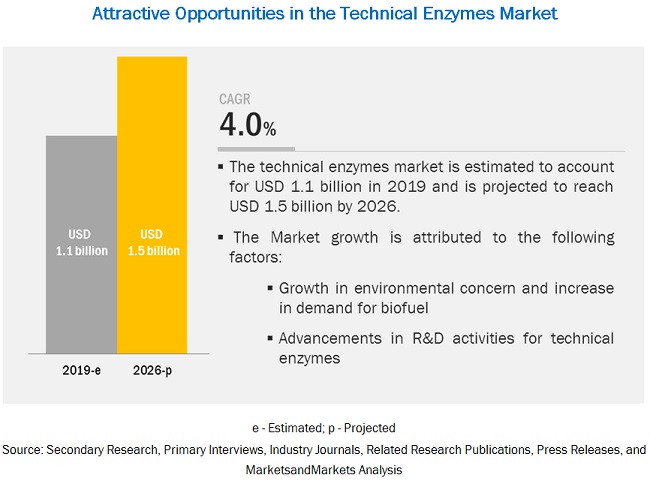The report “Technical Enzymes Market by Type (Amylases, Cellulases, Proteases, and Lipases), Industry (Biofuel, Starch, Textiles & Leather, and Paper & Pulp), Source (Microorganism, Plant, and Animal), Form (Liquid and Dry), and Region – Global Forecast to 2026″, is projected to grow from USD 1.1 billion in 2019 to USD 1.5 billion by 2026, recording a compound annual growth rate (CAGR) of 4.0% during the forecast period. The major factors driving the growth of the technical enzymes market include an increase in demand for biofuel in developing countries and advancements in R&D activities for technical enzymes.

Download PDF Brochure @ https://www.marketsandmarkets.com/pdfdownloadNew.asp?id=72989187
The biofuel industry is projected to be the fastest-growing in the technical enzymes market during the forecast period.
The biofuel industry has witnessed increased usage of technical enzymes. Consumer inclination toward an alternative to gasoline for the reduction in harmful auto & industrial emissions has augmented the usage of biofuels in many developed countries. Enzymes are safer substitutes for MTBE (methyl tert-butyl ether), as MTBE is a blending component to oxygenate gasoline and hazardous to human health.
The microorganism source is projected to account for the largest share in the technical enzymes market during the forecast period.
Microorganisms are the primary source of technical enzymes, as they are cultured in large quantities in a short period, and genetic manipulations can be done on bacterial cells to enhance the enzyme production for usage in various industries such as biofuel, pulp & paper, textile & leather, and starch processing. Additionally, the microbial enzymes are preferred by the manufacturers due to their active and stable nature as compared to enzymes from plants and animals.
The liquid form is projected to account for a larger share in the technical enzymes market during the forecast period.
The liquid form of enzymes is widely used in the biofuel and textile & leather industries, due to better blending properties with the resources used for the production of biofuels. In biofuel, the liquid enzymes augment the supply of liquid fuel; whereas, in textiles, it offers the potential to completely replace the use of other chemicals in textile preparation processes. The enzymatic degreasing process replaces the solvent-based process followed by the leather manufacturers. Since the liquid enzymes interfere less with the skin structure, the enzymatic process also results in a product with improved quality. Due to these factors, the liquid form is projected to dominate the market during the forecast period.
Make an Inquiry @ https://www.marketsandmarkets.com/Enquiry_Before_BuyingNew.asp?id=72989187
The Asia Pacific region is projected to be the fastest-growing market for technical enzymes during the forecast period.
The Asia Pacific region projected to grow at the highest CAGR between 2019 and 2026. The increasing demand for technical enzymes in starch and textile & leather industries is projected to create lucrative growth opportunities for manufacturers in the market in the Asia Pacific region. This dominance is majorly due to the change in technological innovations in machinery, synthetic fibers, logistics, and globalization of business. Furthermore, the shift of industrial operations such as textile & leather production from developed nations in North America and Western Europe into the Asia Pacific region over the past decade has boosted the market for technical enzymes.
Key vendors in the global technical enzymes market include BASF (Germany), DuPont (US), Associated British Foods (UK), Novozymes (Denmark), DSM (Netherlands), Dyadic International (US), Advanced Enzymes Technologies (India), Maps Enzymes (India), Epygen Labs (India), Megazyme (Ireland), Aumgene Biosciences (India), Enzymatic Deinking Technologies (US), Tex Biosciences (India), Denykem (UK), MetGen (Finland), and Creative Enzymes (US). These players have broad industry coverage and high operational and financial strength.